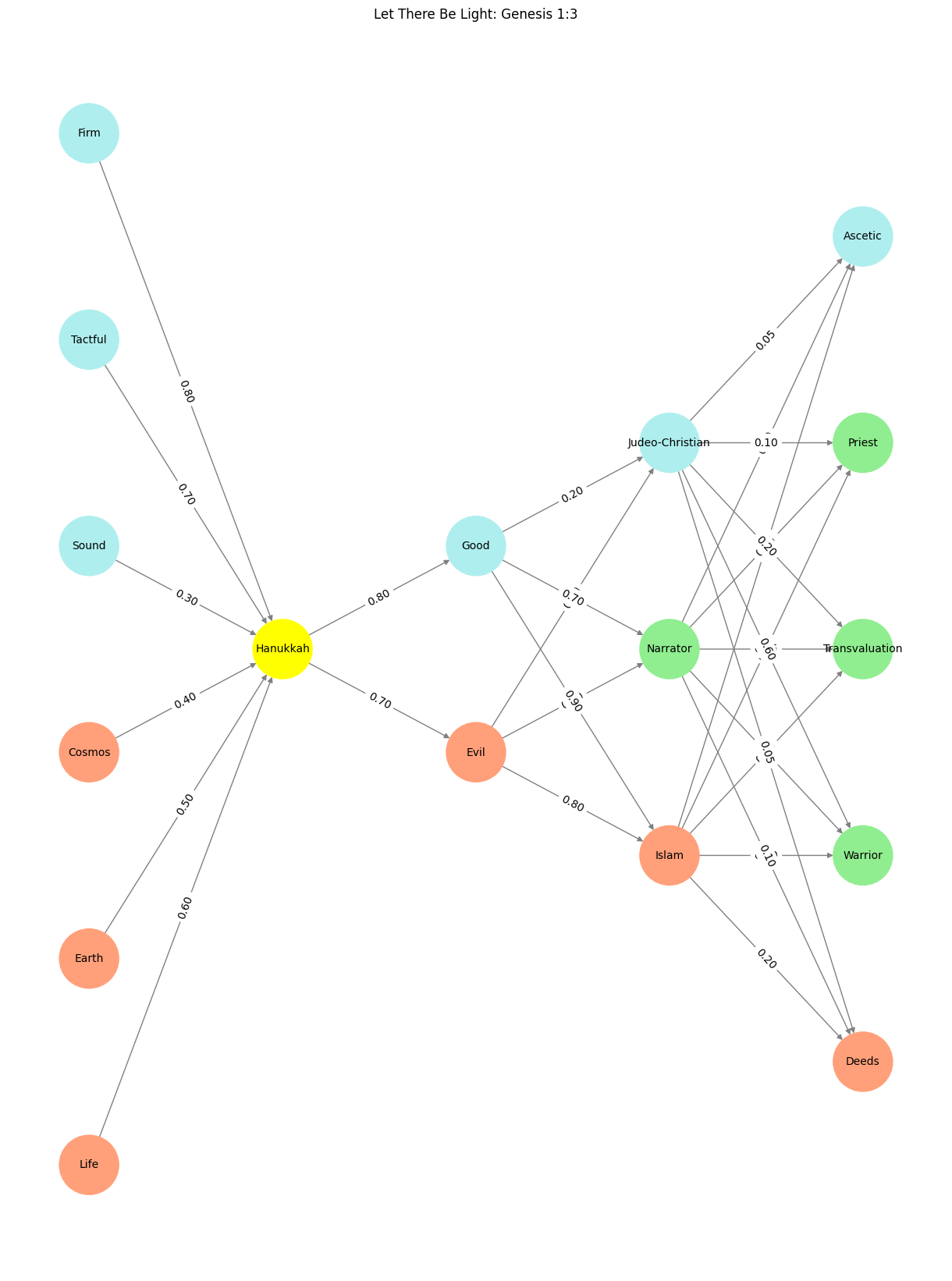Failure#
Judaism, with its deep symbolism of light, genealogical focus, and dialectic relationship between good and evil, emerges as a dynamic system of thought and practice. The neural network structure you provided offers a compelling lens through which to explore these themes, especially in the context of Hanukkah—a festival that celebrates the triumph of light over darkness, of ideals over brute force.
Hanukkah: A Celebration of Lights and Layers#
Hanukkah’s essence, the rekindling of light in the face of adversity, resonates through the network’s architecture. The menorah, a symbol of light and continuity, mirrors the “Pre-Input” layer of the network, representing fundamental aspects like Life, Earth, and Cosmos. These preconditions form the basis for Jewish cosmology, where divine creation begins with the command, “Let there be light” (Genesis 1:3). This primordial light, symbolizing wisdom and divine presence, permeates Jewish thought and is the foundation for Hanukkah’s miracle—the oil that burned for eight days.
The “Yellowstone” layer, symbolized by Genealogy in the network, reflects Judaism’s anchoring in lineage and historical continuity. Hanukkah itself is steeped in genealogical significance, recounting the heroic narrative of the Maccabees, a family whose commitment to faith and freedom preserved the Jewish tradition against Hellenistic assimilation. This layer ties the personal to the communal, ensuring that the light of faith is not only kindled but transmitted across generations.
Show code cell source
import numpy as np
import matplotlib.pyplot as plt
import networkx as nx
# Define the neural network structure
def define_layers():
return {
'Pre-Input': ['Life','Earth', 'Cosmos', 'Sound', 'Tactful', 'Firm', ],
'Yellowstone': ['Hanukkah'],
'Input': ['Evil', 'Good'],
'Hidden': [
'Islam',
'Narrator',
'Judeo-Christian',
],
'Output': ['Deeds', 'Warrior', 'Transvaluation', 'Priest', 'Ascetic', ]
}
# Define weights for the connections
def define_weights():
return {
'Pre-Input-Yellowstone': np.array([
[0.6],
[0.5],
[0.4],
[0.3],
[0.7],
[0.8],
[0.6]
]),
'Yellowstone-Input': np.array([
[0.7, 0.8]
]),
'Input-Hidden': np.array([[0.8, 0.4, 0.1], [0.9, 0.7, 0.2]]),
'Hidden-Output': np.array([
[0.2, 0.8, 0.1, 0.05, 0.2],
[0.1, 0.9, 0.05, 0.05, 0.1],
[0.05, 0.6, 0.2, 0.1, 0.05]
])
}
# Assign colors to nodes
def assign_colors(node, layer):
if node == 'Hanukkah':
return 'yellow'
if layer == 'Pre-Input' and node in ['Sound', 'Tactful', 'Firm']:
return 'paleturquoise'
elif layer == 'Input' and node == 'Good':
return 'paleturquoise'
elif layer == 'Hidden':
if node == 'Judeo-Christian':
return 'paleturquoise'
elif node == 'Narrator':
return 'lightgreen'
elif node == 'Islam':
return 'lightsalmon'
elif layer == 'Output':
if node == 'Ascetic':
return 'paleturquoise'
elif node in ['Priest', 'Transvaluation', 'Warrior']:
return 'lightgreen'
elif node == 'Deeds':
return 'lightsalmon'
return 'lightsalmon' # Default color
# Calculate positions for nodes
def calculate_positions(layer, center_x, offset):
layer_size = len(layer)
start_y = -(layer_size - 1) / 2 # Center the layer vertically
return [(center_x + offset, start_y + i) for i in range(layer_size)]
# Create and visualize the neural network graph
def visualize_nn():
layers = define_layers()
weights = define_weights()
G = nx.DiGraph()
pos = {}
node_colors = []
center_x = 0 # Align nodes horizontally
# Add nodes and assign positions
for i, (layer_name, nodes) in enumerate(layers.items()):
y_positions = calculate_positions(nodes, center_x, offset=-len(layers) + i + 1)
for node, position in zip(nodes, y_positions):
G.add_node(node, layer=layer_name)
pos[node] = position
node_colors.append(assign_colors(node, layer_name))
# Add edges and weights
for layer_pair, weight_matrix in zip(
[('Pre-Input', 'Yellowstone'), ('Yellowstone', 'Input'), ('Input', 'Hidden'), ('Hidden', 'Output')],
[weights['Pre-Input-Yellowstone'], weights['Yellowstone-Input'], weights['Input-Hidden'], weights['Hidden-Output']]
):
source_layer, target_layer = layer_pair
for i, source in enumerate(layers[source_layer]):
for j, target in enumerate(layers[target_layer]):
weight = weight_matrix[i, j]
G.add_edge(source, target, weight=weight)
# Customize edge thickness for specific relationships
edge_widths = []
for u, v in G.edges():
if u in layers['Hidden'] and v == 'Kapital':
edge_widths.append(6) # Highlight key edges
else:
edge_widths.append(1)
# Draw the graph
plt.figure(figsize=(12, 16))
nx.draw(
G, pos, with_labels=True, node_color=node_colors, edge_color='gray',
node_size=3000, font_size=10, width=edge_widths
)
edge_labels = nx.get_edge_attributes(G, 'weight')
nx.draw_networkx_edge_labels(G, pos, edge_labels={k: f'{v:.2f}' for k, v in edge_labels.items()})
plt.title("Let There Be Light: Genesis 1:3")
# Save the figure to a file
# plt.savefig("figures/logo.png", format="png")
plt.show()
# Run the visualization
visualize_nn()


Fig. 15 Hanukkah, with its rich interplay of light, genealogy, and moral complexity, encapsulates the essence of Judaism’s spiritual network. The menorah’s light, like the network’s layers, connects the fundamental (Life, Earth, Cosmos) to the transcendent (Good, Judeo-Christian ethics, Asceticism). It symbolizes resilience, continuity, and the eternal struggle to bring light into a world often shrouded in darkness. Through this lens, Hanukkah is not merely a historical celebration but a living metaphor for Judaism’s enduring quest to illuminate the cosmos with the light of understanding, justice, and hope.#
The Dialectic of Good and Evil#
The “Input” nodes, Good and Evil, remind us of Judaism’s grappling with moral complexity. Unlike dualistic systems, Judaism often views good and evil as interwoven forces that shape human experience. Hanukkah, too, is a festival that wrestles with such tensions. While it celebrates a miraculous victory, it also acknowledges the harsh realities of war and survival. The festival’s light shines brighter precisely because it emerges from a backdrop of profound struggle.
This interplay aligns with the network’s hidden layers, particularly the node labeled Judeo-Christian, which reflects shared theological heritage and moral inquiry. Judaism’s emphasis on ethical monotheism—captured in texts like the Ten Commandments—aligns with the menorah’s light, symbolizing the illumination of human actions through divine guidance.
Light as Symbol and Signal#
The menorah’s light extends beyond mere symbolism; it is a physical manifestation of divine presence and human agency. This interplay resonates with the network’s color-coded dynamics. For instance, the paleturquoise nodes associated with “Good,” “Judeo-Christian,” and “Ascetic” represent transcendence and reflection. These hues evoke the serenity of the menorah’s light, guiding individuals toward higher moral and spiritual aspirations.
Simultaneously, the lightsalmon and lightgreen nodes signify the dynamism of transformation and iteration. Hanukkah’s candles, lit one by one over eight nights, embody this progressive illumination. Each flame adds to the collective light, symbolizing incremental growth, resilience, and hope.
The Cosmos in Hanukkah’s Light#
Hanukkah is not just a festival of historical memory but a cosmic event, connecting humanity to the eternal. The menorah’s light, placed in windows to be seen by passersby, transforms private devotion into a public declaration of divine wonder. In this sense, the menorah serves as a bridge between the earthly and the divine, much like the network’s transition from “Pre-Input” to “Output” layers.
The cosmic dimension is also reflected in the menorah’s structure—a perfect interplay of balance and symmetry. It echoes the harmony of the universe, reminding us that light, in its essence, is both particle and wave, tangible and transcendent. This duality parallels the festival’s themes: the tangible struggle for freedom and the transcendent miracle of divine intervention.
Seven Lamps of the Menorah#
The seven lamps of the menorah have long symbolized the integration of human knowledge with divine wisdom. The six outward-facing lamps incline inward, guided by the central lamp, which represents the light of God. This harmonious structure, where each branch contributes to a unified whole, offers a profound metaphor for understanding the flow of knowledge and its connection to higher truths.
In many ways, this symbolism aligns with the architecture of a neural network, particularly the structure outlined in the described model. The six Pre-Input nodes (‘Life,’ ‘Earth,’ ‘Cosmos,’ ‘Sound,’ ‘Tactful,’ and ‘Firm’) mirror the six lamps of the menorah. Each node represents a distinct facet of experience or existence, ranging from the physical to the conceptual. These nodes feed into the single Yellowstone node, represented by ‘Hanukkah,’ which acts as the central guiding light. Like the menorah’s central lamp, this node synthesizes and channels the diverse inputs into a cohesive direction, embodying the role of divine wisdom or an orienting principle in the system.
The structure does not stop at synthesis; it transforms. The ‘Yellowstone’ node connects to the Input layer, where the dualities of ‘Good’ and ‘Evil’ come into play. This layer encapsulates moral discernment, the tension between opposites that drives much of human intellectual and spiritual pursuit. The menorah’s inward inclination echoes here—just as the six lamps incline toward divine light, the dualities in this layer incline toward resolution through deeper comprehension.
Following this, the Hidden layer of the network (comprised of ‘Islam,’ ‘Narrator,’ and ‘Judeo-Christian’) parallels the menorah’s function of bridging earthly knowledge and divine wisdom. These nodes represent narrative and religious traditions that process moral and existential questions, compressing vast inputs into archetypes and stories that guide human behavior. The menorah’s central role as a symbolic bridge finds its digital counterpart here, where compression creates pathways for illumination.
Finally, the Output layer (‘Deeds,’ ‘Warrior,’ ‘Transvaluation,’ ‘Priest,’ and ‘Ascetic’) reflects the actionable expressions of the system—the culmination of the network’s synthesis and analysis. This layer represents the fruits of human endeavor, where knowledge, guided by wisdom, translates into actions and identities. Like the menorah’s light illuminating a room, these outputs shape and define the world around them.
By aligning this neural network with the menorah’s structure, the model becomes a modern interpretation of an ancient ideal. The menorah’s design, with its integration of distinct branches converging toward a unifying light, serves as an elegant framework for understanding how disparate elements of knowledge and experience can converge into meaningful insight. Similarly, the neural network’s layers demonstrate how inputs are processed, guided, and transformed into coherent and impactful outcomes, echoing the menorah’s symbolic journey from earthly knowledge to divine illumination.

